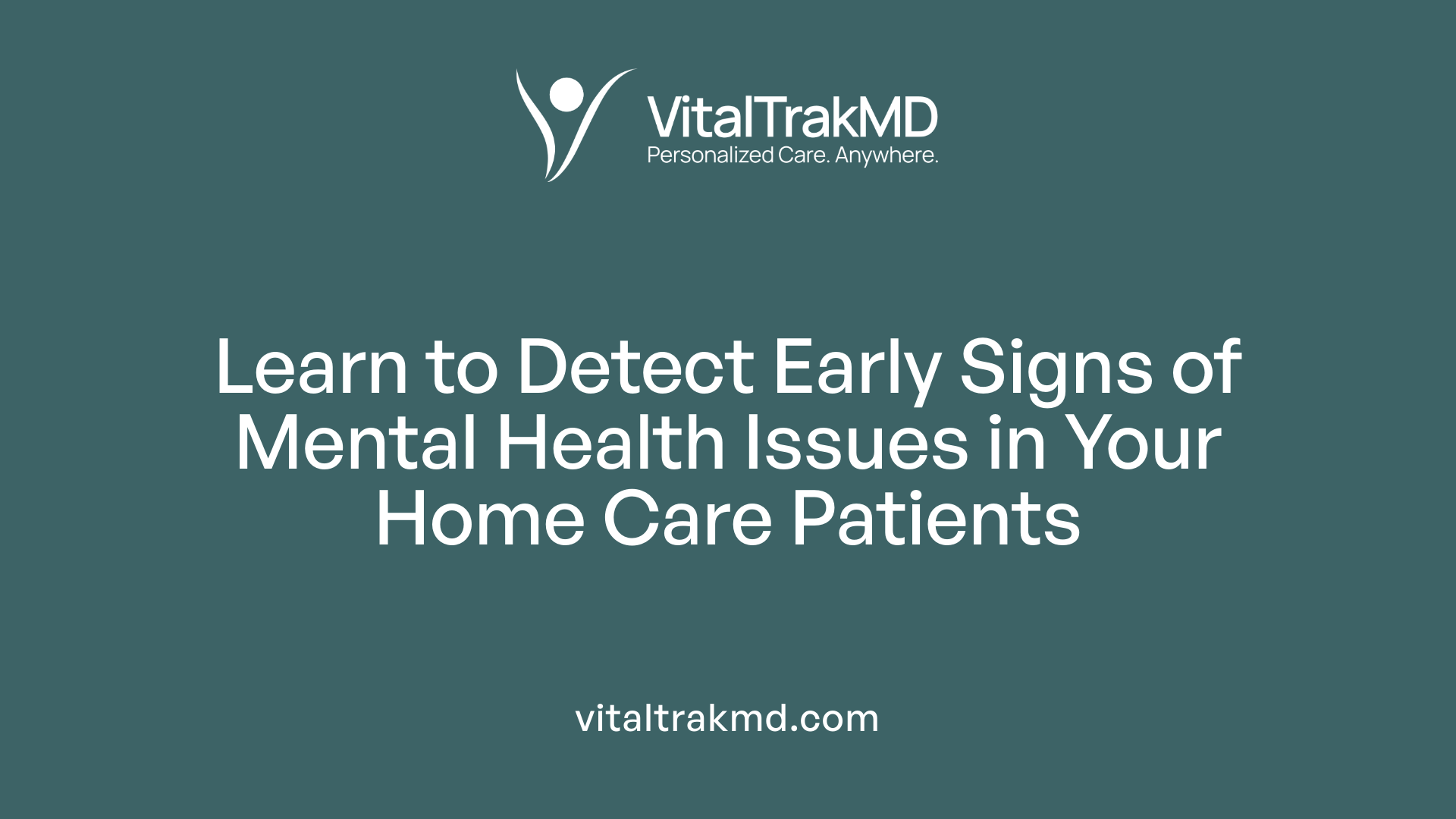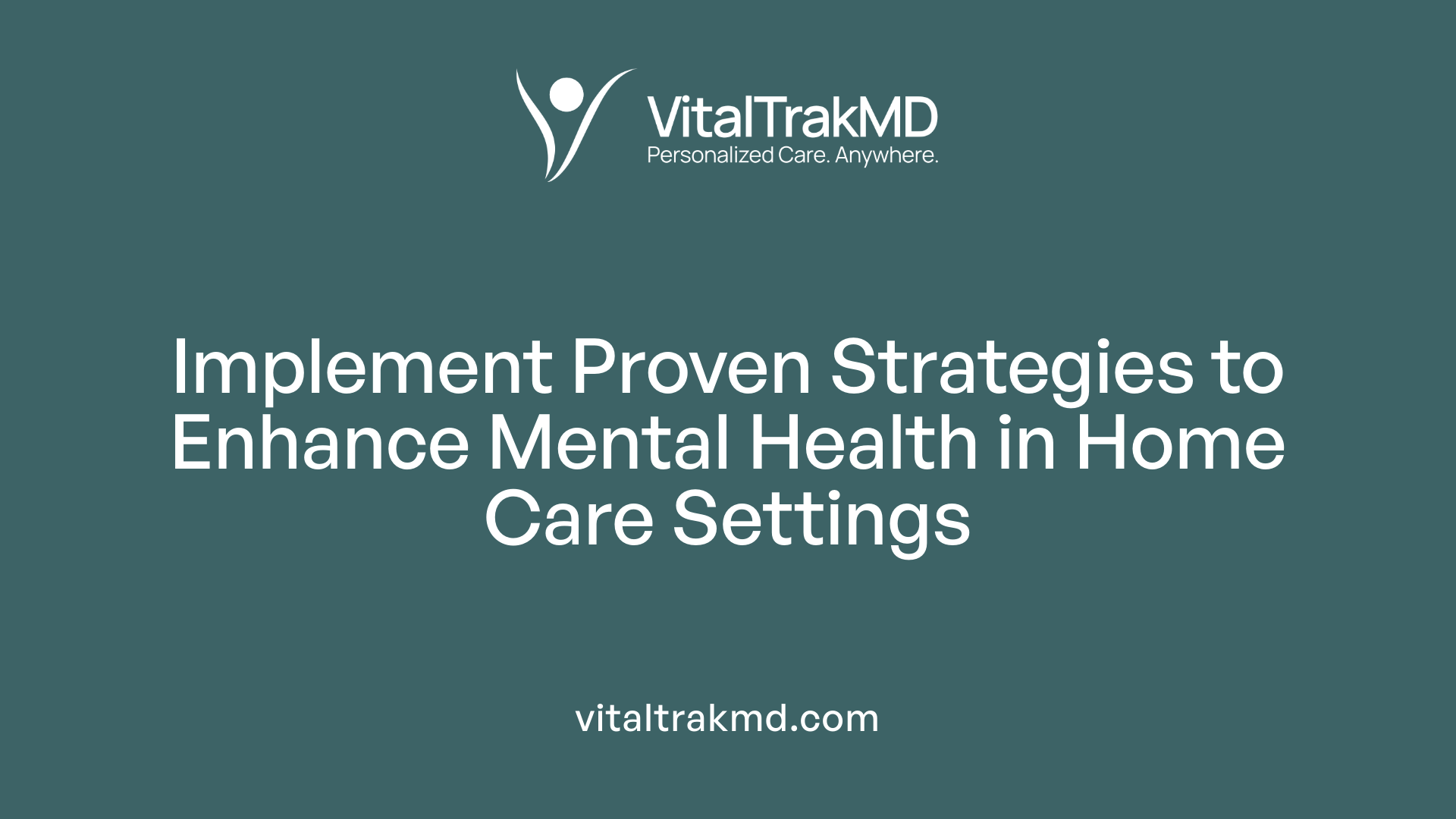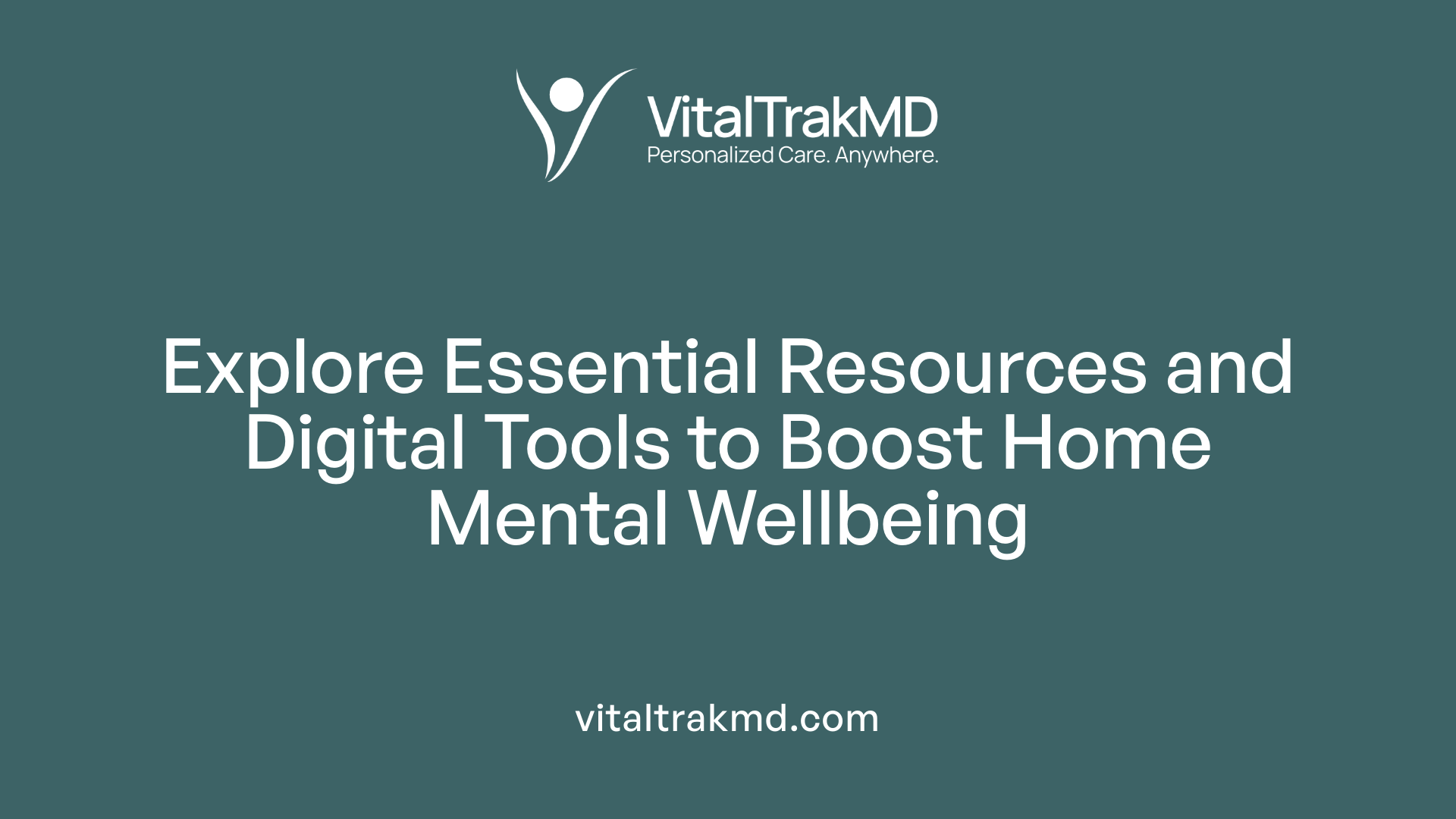Supporting Mental Wellness in Home Care Patients

Understanding the Importance of Mental Wellness in Home Care
As home care becomes an increasingly vital component of healthcare, especially for seniors and chronically ill patients, supporting mental wellness is crucial for improving overall quality of life and health outcomes. This article explores the unique emotional challenges faced by home care patients and caregivers, effective strategies for promoting mental health, and the role of community resources and professional support in creating a holistic, supportive environment.
The Impact of Personal and Cultural Factors on Mental Health Perceptions

How do attitudes toward mental health get shaped by personal experiences and cultural background?
Attitudes towards mental health are deeply influenced by personal life experiences as well as cultural norms and beliefs. Individuals' past encounters with mental illness, either personally or within their family, can shape whether they view such conditions with acceptance or stigma. For instance, someone who has seen a family member recover through treatment may be more open to seeking help themselves.
Cultural background plays a significant role in defining what is considered acceptable or taboo regarding mental health. Some cultures might see mental illness as a weakness or moral failing, which discourages individuals from discussing their struggles or seeking support. Conversely, cultures that emphasize community and familial support might promote openness and collective caregiving.
These perceptions influence not only personal attitudes but also the behavior of caregivers and healthcare providers. Understanding these diverse perspectives is essential for developing effective mental health interventions in home care settings.
What is caregiver syndrome, and how does it affect mental health?
Caregiver syndrome, also called caregiver stress or burnout, refers to the physical, emotional, and mental health symptoms resulting from sustained caregiving duties. Caregivers—often unpaid family members—manage medical tasks, personal care, and emotional support, which can be overwhelming.
Symptoms include fatigue, depression, anxiety, irritability, social withdrawal, and physical health issues such as high blood pressure or immune system weakening. The syndrome develops due to role overload, constant responsibility, insufficient support, and feelings of helplessness or guilt.
If unmanaged, caregiver syndrome can severely impair mental wellness, leading to emotional exhaustion and declining physical health. It may also affect the quality of care provided to loved ones.
Managing caregiver fatigue involves seeking help from support services, practicing self-care routines, and maintaining open communication with health professionals to mitigate the syndrome's effects.
Why is behavioral health support important in home care?
Behavioral health support plays a crucial role in home care because it addresses psychological challenges that can impact recovery and overall wellbeing. Many patients, especially seniors, grapple with depression, anxiety, or behavioral issues that are often overlooked.
The importance of mental health services at home has increased significantly after COVID-19, as social isolation has intensified the emotional struggles of vulnerable populations. Early detection and intervention are vital because they help improve emotional resilience, promote independence, and potentially prevent hospital readmissions.
Skilled home care teams equipped with mental health training work to recognize early warning signs like mood swings, withdrawal, or cognitive decline. They deliver tailored interventions, such as therapy or medication management, supporting stronger mental health.
Integrating behavioral health into home care creates a holistic approach that enhances coping skills, reduces distress, and empowers individuals to manage their conditions effectively within the comfort of their home environment.
| Aspect | Significance | Impact on Care and Well-being |
|---|---|---|
| Attitudes based on personal/cultural factors | Shapes acceptance or stigma | Influences help-seeking behavior + family support |
| Caregiver syndrome | Causes physical and mental health decline | Affects quality of caregiving + caregiver health |
| Behavioral health in home care | Addresses overlooked emotional issues | Promotes recovery, independence, and reduce hospital stays |
Understanding these elements underscores the importance of culturally sensitive, supportive, and comprehensive mental health strategies for home care patients and their caregivers. Providing culturally appropriate education, support systems, and early behavioral health interventions can significantly improve overall outcomes and quality of life.
Recognizing Early Signs of Mental Health Challenges in Home Care Patients

What are the signs and symptoms of mental health issues in home care patients?
Home care patients may show various indicators of mental health concerns that caregivers should be vigilant about. Mood changes like persistent sadness, irritability, or suspicion can signal underlying emotional struggles. Behavioral shifts often include withdrawal from usual activities, social isolation, or difficulty managing daily routines, which may reflect worsening mental health.
Cognitive symptoms are also noteworthy. These can manifest as confusion, difficulty concentrating, or memory lapses, especially in older adults or those with cognitive decline. Physical signs may include sleep disturbances, such as insomnia or oversleeping, noticeable changes in appetite and weight, feelings of fatigue, or unexplained aches and pains.
Caregivers should be attentive to these signs, observing emotional expressions, sleep and eating habits, and overall behavioral patterns. Early detection allows for timely intervention, which can significantly improve the patient's quality of life. Regular communication with healthcare professionals and fostering a trusting environment for open discussions are essential steps in addressing potential mental health issues.
The Critical Role of Family Involvement in Mental Health Support

How can caregivers support the mental wellness of home care patients?
Family caregivers play an essential role in maintaining and enhancing the mental health of individuals receiving home care. Their support begins with fostering open and honest communication, which helps the patient feel safe and understood. Active listening and showing empathy encourage emotional connection, reducing feelings of isolation.
Encouraging social interactions is another vital step. Facilitating engagement in community events, hobbies, or regular visits with friends can lift spirits and combat loneliness. Physical activity and mental exercises are also beneficial, as they promote mood stabilization and cognitive health.
Providing access to mental health resources, such as support groups, educational materials, and professional services, ensures patients get appropriate care promptly. Establishing routines that include both physical and mental activities offers stability and a sense of purpose, which are crucial for emotional well-being.
Caregivers should remain vigilant for signs of depression or anxiety, such as mood shifts, withdrawal, or changes in sleep or appetite, and seek timely professional intervention. Connecting patients to confidential mental health services can be a decisive step toward recovery and resilience.
What are common mental health challenges faced by home care patients and caregivers?
In the home care setting, both patients and caregivers face unique mental health challenges. Patients often struggle with depression, anxiety, and emotional distress stemming from chronic illness, mobility limitations, or cognitive decline. These conditions can lead to feelings of helplessness, frustration, and social withdrawal.
Caregivers, on the other hand, frequently experience high stress levels, burnout, compassion fatigue, and social isolation. The demanding nature of caregiving tasks—such as medication management, personal care, and emotional support—can result in irritability, sleep disturbances, and exhaustion.
Recognizing early signs like mood swings, behavioral changes, or cognitive difficulties is vital for intervention. Support strategies such as open communication, stress management practices, and self-care routines are essential tools. Access to mental health professionals and community support programs can alleviate emotional strain.
Efforts to increase community awareness, reduce stigma associated with mental health issues, and expand targeted outreach programs are crucial. These initiatives can bolster mental health support and improve overall well-being for both patients and their caregivers in home environments.
Implementing Evidence-Based Practices to Support Mental Wellness

What evidence-based practices can improve mental wellness for home care patients?
Enhancing mental health outcomes in home care settings involves several proven strategies. Regular mental health screenings are essential for early detection of issues such as depression, anxiety, or cognitive decline. These assessments help caregivers and healthcare providers identify problems before they escalate. Additionally, fostering meaningful social connections can significantly alleviate loneliness and social isolation, common issues among seniors and other vulnerable populations.
Integrating behavioral health services directly into routine care ensures that patients have immediate access to mental health professionals, including counseling, medication management, and psycho-educational support. Promoting self-care routines—like maintaining physical activity, adhering to balanced nutrition, ensuring sufficient sleep, and engaging in mentally stimulating activities—can boost overall well-being.
Caregivers themselves should prioritize their mental health by utilizing respite care options to reduce burnout, seeking social support, and establishing consistent routines that enhance stability and emotional resilience. Furthermore, leveraging community resources such as crisis helplines, online support groups, and mental health professionals can provide additional layers of assistance. Creating a supportive environment through open communication and social engagement remains critical, helping individuals maintain mental wellness and recover from psychological setbacks.
How can the role of home health care services support mental health?
Home health care services serve as a crucial pillar in mental health support by offering personalized, accessible care in a familiar environment. These services include comprehensive mental health assessments, therapy sessions, and medication management tailored to individual needs. Programs like Amedisys’ behavioral health home care or Behavioral Health at Home extend psychiatric nursing, counseling, and education to homebound patients, reducing hospital admissions and promoting stability.
Collaboration with organizations such as Metrocare Services enhances access to a broad spectrum of mental health resources, crisis hotlines, and community-based support. This integration ensures that patients receive continuous care, which is vital for managing chronic mental health conditions and preventing deterioration.
Home health services foster strong patient-provider relationships, enabling better understanding of individual challenges and more effective treatment plans. They also empower individuals to maintain independence and manage their conditions confidently. Overall, embedding mental health services into home care routines improves health outcomes, supports recovery, and enhances quality of life for those with mental health needs.
Supporting Caregivers' Mental Health for Sustainable Home Care
What strategies can caregivers use to manage their own mental health while caring for others?
Caring for a loved one can be emotionally and physically demanding, making it essential for caregivers to prioritize their own mental health. One effective approach is seeking support from friends, family, or caregiver support groups, which provides emotional relief and shared experiences. Connecting with mental health professionals through counseling or therapy can help process feelings of stress, frustration, or sadness, while also building coping skills.
Practicing self-care habits such as maintaining a balanced diet, ensuring adequate sleep, and engaging in physical activities like walking or yoga can significantly reduce stress. Relaxation techniques such as mindfulness meditation or deep breathing exercises enable caregivers to remain calm during challenging times.
Setting boundaries around caregiving responsibilities prevents burnout. Asking for and accepting help—including respite care services—can provide much-needed breaks. Utilizing community resources, such as the Eldercare Locator or Area Agency on Aging, offers access to additional support programs and services designed to ease caregiving burdens.
Finally, establishing realistic goals and recognizing limitations helps maintain mental resilience, ensuring caregivers can continue providing compassionate care without sacrificing their own well-being.
Why is caregiver support crucial for mental health—that of both patients and caregivers?
Support systems for caregivers are fundamental because their mental health impacts their ability to deliver high-quality care and their overall physical health. When caregivers experience high stress levels, they risk developing depression, anxiety, and physical ailments such as heart disease or diabetes. These conditions can compromise their ability to care effectively, posing safety risks for the patient.
Providing emotional support, opportunities for respite, and educational resources empowers caregivers to manage their responsibilities better. Respite care options—including in-home aides, adult day centers, or short-term nursing facility stays—offer vital breaks that help prevent burnout.
Moreover, community programs and policies like paid leave ensure caregivers can take necessary time off without financial hardship. Supporting caregivers' mental health not only preserves their well-being but also contributes to a more stable, nurturing environment for the patient. Overall, recognizing and addressing caregiver mental wellness sustains the caregiving relationship and fosters positive health outcomes for all involved.
| Support Strategies | Benefits | Additional Details |
|---|---|---|
| Peer support groups | Emotional relief | Sharing experiences reduces isolation |
| Respite care services | Prevents burnout | Short-term relief options include in-home care and adult day programs |
| Mental health counseling | Coping skills development | Professional guidance helps process caregiving stress |
| Self-care routines | Enhances resilience | Includes sleep, nutrition, exercise, and relaxation techniques |
| Community resource utilization | Access to support services | Eldercare Locator, Area Agency on Aging, online tools |
How can caregivers implement self-care practices like maintaining sleep, nutrition, and relaxation techniques?
Implementing effective self-care practices is central to maintaining mental and physical health amid caregiving duties. First, establishing consistent sleep routines—such as going to bed and waking up at the same time—helps improve sleep quality, reducing fatigue.
Nutrition plays a vital role; caregivers should aim for balanced meals rich in fruits, vegetables, lean proteins, and whole grains. Planning meals ahead of time can ensure proper nutrition even during busy days.
Incorporating physical activity into daily routines is beneficial, whether through walking, stretching, or yoga, which also serves as a stress reliever.
Relaxation techniques such as mindfulness meditation, deep breathing exercises, or progressive muscle relaxation can be practiced daily—often in just a few minutes—to lower anxiety levels.
Creating a personal sanctuary for relaxation, like a quiet corner for meditation or listening to calming music, enhances their effectiveness. Additionally, caregivers should schedule regular breaks during the day to step away, even briefly, to reset.
Finally, recognizing the importance of mental health and seeking professional support when needed ensures ongoing emotional well-being. These practices collectively foster resilience and enable caregivers to sustain their vital role in home care.
| Self-Care Practice | Recommended Actions | Impact |
|---|---|---|
| Sleep hygiene | Maintain consistent sleep schedule | Reduces fatigue and improves mood |
| Nutrition | Eat balanced, nutritious meals | Supports overall health and energy |
| Physical activity | Regular walking or yoga | Alleviates stress and boosts mood |
| Relaxation techniques | Meditation, deep breathing | Lowers anxiety and enhances mental clarity |
| Breaks and boundaries | Scheduled short breaks | Prevents burnout and maintains focus |
| Summary of Caregiver Support Approaches | Description |
|---|---|
| Seeking emotional support | Joining groups, speaking with professionals |
| Utilizing respite services | Short-term relief via formal services |
| Engaging in regular self-care | Sleep, nutrition, exercise, relaxation |
| Using community resources | Local agencies and online tools |
By proactively adopting these strategies, caregivers can sustain their mental health, delivering compassionate, effective care while also preserving their own quality of life.
Resources and Tools to Foster Mental Wellness at Home

What resources and tools are available to promote mental health in home care environments?
Supporting mental health within home care settings is crucial for both patients and caregivers. A variety of resources and tools are accessible to help foster emotional well-being and manage stress effectively.
One of the most essential resources is the availability of national and provincial mental health hotlines. These helplines provide immediate support, crisis intervention, and guidance for individuals experiencing emotional distress. For example, the 9-8-8 crisis helpline offers a straightforward, accessible number for immediate mental health assistance, ensuring help is available 24/7.
Regional support services include specific helplines such as 1-800-784-2433 and provincial services like those offered by the CMHA BC. These organizations deliver tailored assistance, educational programs, and guidance suited to local needs.
Educational materials and peer support programs also play a vital role. Many organizations, including NAMI and local health authorities, provide webinars, podcasts, and supportive conversation libraries. These resources not only disseminate vital mental health information but also facilitate peer connections, reducing isolation for caregivers and patients.
Digital tools, including mindfulness applications, stress management programs, and mental health tracking apps, are increasingly popular. These tools help individuals develop coping strategies, promote relaxation, and monitor their emotional well-being.
Guidance on navigating difficult conversations and building emotional resilience is another vital aspect. Resources offering communication tips help caregivers and patients discuss sensitive issues openly and effectively, reducing misunderstandings and emotional burden.
Organizations like the Canadian Mental Health Association (CMHA BC) and other community-based organizations provide culturally sensitive and accessible support materials. They help caregivers and families understand mental health challenges and find appropriate interventions tailored to their unique circumstances.
In addition to these, resources such as support groups, educational workshops, and online forums foster community engagement and shared learning. These avenues encourage individuals to learn from others' experiences and build resilience in a supportive environment.
Collaborating with mental health professionals and community organizations is essential for delivering comprehensive care. They can provide personalized recommendations and help adapt tools specifically to the cultural and individual needs of patients and caregivers.
By utilizing these diverse resources—ranging from helplines and educational materials to digital applications and community programs—home care environments can become more supportive, responsive, and effective in promoting mental health.
| Resource Type | Examples & Focus Areas | Additional Notes |
|---|---|---|
| Helplines & Crisis Lines | 9-8-8, 1-800-784-2433, provincial mental health lines | Immediate support, crisis intervention |
| Educational Materials | Webinars, podcasts, supportive conversation libraries | Information dissemination, peer connection |
| Digital Tools | Mindfulness apps, stress management programs, mood trackers | Self-guided coping strategies |
| Support Programs & Groups | Peer support groups, family caregiver resources, support forums | Community engagement, shared experiences |
| Professional Support | Counseling, therapy, community-based interventions | Personalized mental health care |
This comprehensive approach ensures that caregivers and individuals in home care settings are equipped with the necessary tools to maintain and improve mental wellness. Access to appropriate resources can help reduce emotional strain, foster resilience, and create a supportive environment conducive to mental health stability.
Fostering a Holistic Approach to Mental Wellness in Home Care
Supporting mental wellness in home care patients requires a comprehensive, culturally sensitive, and proactive approach involving patients, caregivers, families, and healthcare providers. Early detection, tailored interventions, community resources, and ongoing education are key to promoting resilience, emotional stability, and overall quality of life. By integrating behavioral health support, encouraging self-care, and empowering families, we can create an environment where vulnerable populations thrive physically and emotionally within the comfort of their own homes.
References
- Mental Health and Well-Being Among Home Health Aides - PMC
- Caregiver stress: Tips for taking care of yourself - Mayo Clinic
- Family Members and Caregivers
- Supporting Mental Health in Home Health Care: Why It Matters for ...
- Navigating Mental Health Challenges in Home Care Patients
- What is In-Home Behavioral Health Care? - Elara Caring
- In-Home Behavioral Health Services - Ennoble Care
- Supporting Family Caregivers in Providing Care - NCBI
Recent articles
Want to Feel Better and Live Healthier?
Join hundreds of patients taking control of their health with personalized care that fits their life – not the other way around.
Rated 4.8/5 by 32+ customers







